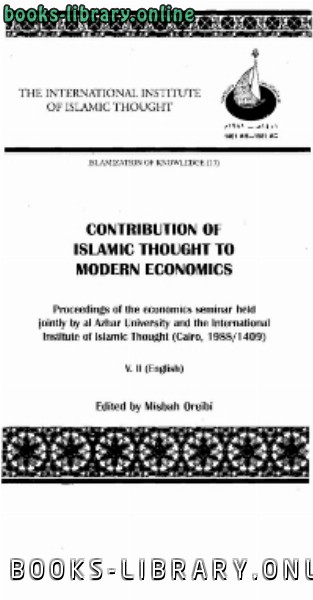📘 قراءة كتاب Contribution of Islamic Thought to Modern Economics أونلاين


Introduction ..................................... 1
Misbah Oreibi
Teaching Programs in Islamic Economics:
A Comparative Study ........................... 7
Munawar Iqbal
Discussant . . . . . . . . . . ........................ 49
Abdul Rahman Yusri
How to Teach Microeconomics in Islamic Perspective at
Intermediate Level in an Undergraduate Program ..... 55
M. F ahim Khan
Discussant ................................. 115
Shawqi A. Dunia
Discussant ................................. 119
Muhammad Adaniyat
Economic Development in Muslim Countries:
A Strategy for Development in the Light of
Islamic Teachings . . . . . . . . . . . . . . . . . . . . . . . . . . . . 127
M. Umar Chapra
Discussant ................................. 201
Abdul Hadi al Najjar
Stabilization and Growth in an
Open Islamic Economy ....................... 207
Abbas Mirakhor and Iqbal Zaidi
Discussant ................................. 239
Medhat Hassanein
Discussant ................................. 243
Hanaa Kheir-el-Din
Development and Islam: Selected Bibliography ........ 247
This book contains papers presented at the Conference on the
Contribution of Islamic Thought to Modern Economics held in
Cairo, Egypt, on 25-28 Mu]).arram, 1409 A.H./ 6-9 September, 1988
A.C. sponsored by Salih Kamil Center for Islamic Commercial
Research and Studies at al Azhar University and the International
Institute of Islamic Thought.
Islamic economics is not entirely a new subject; it has been
developed as an integral part of the wider subject of Islamic jurispru-
dence (fiqh), and is as old as the Islamic way of life. Fiqh
al mu' iimaliil branch of Islamic jurisprudence covered different
aspects of economic activities such as market organization, sale con-
tracts, financial dealings, types of company structures in production
and consumer protection. Gradually, international trade became an
important economic sector that required tariff estimation and collec-
tion, organized transport facilities and trained personnel.
The economic life of the early Muslim community grew in com-
plexity with the expansion of Islam into most parts of the world and
international trade played an important role in this expansion. In the
process of Islamic expansion new peoples accepted Islam and new
territories and countries became part of the caliphate (khilafah).
Muslims encountered new and complex methods of production, new
technology, and a wider range of products and crops. The free
exchange of goods and the free movement of people within the
Muslim state enhanced the well-being of its citizens, increased its
financial resources thereby allowing it to extend welfare services to
all its citizens, irrespective of their belief, race, or background. Even
when the unity of the caliphate was no longer sustainable, the free
exchange of goods and capital and the free movement of people con-
tinued to be the rule rather than the exception.
Book author :
Proceedings of the economics seminar held jointly by al Azhar University and the International Institute of Islamic Thought _Cairo, 1988/1409_ This book contains papers presented at the Conference on the held in Cairo, Egypt, on 2528 Muharram, 1409 A.H.169 September, 1988 A.C. sponsored by Salih Kamil Center for ...
سنة النشر : 1981م / 1401هـ .
حجم الكتاب عند التحميل : 2.9 ميجا بايت .
نوع الكتاب : pdf.
عداد القراءة:
اذا اعجبك الكتاب فضلاً اضغط على أعجبني و يمكنك تحميله من هنا:

شكرًا لمساهمتكم
شكراً لمساهمتكم معنا في الإرتقاء بمستوى المكتبة ، يمكنكم االتبليغ عن اخطاء او سوء اختيار للكتب وتصنيفها ومحتواها ، أو كتاب يُمنع نشره ، او محمي بحقوق طبع ونشر ، فضلاً قم بالتبليغ عن الكتاب المُخالف:
 قبل تحميل الكتاب ..
قبل تحميل الكتاب ..
يجب ان يتوفر لديكم برنامج تشغيل وقراءة ملفات pdf
يمكن تحميلة من هنا 'http://get.adobe.com/reader/'


 منصّة المكتبة
منصّة المكتبة 